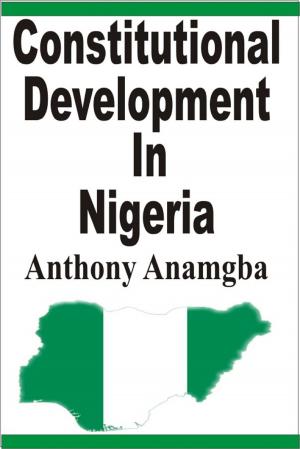| Author: | Anthony Anamgba | ISBN: | 9781540183620 |
| Publisher: | Anthony Anamgba | Publication: | March 25, 2017 |
| Imprint: | Language: | English |
| Author: | Anthony Anamgba |
| ISBN: | 9781540183620 |
| Publisher: | Anthony Anamgba |
| Publication: | March 25, 2017 |
| Imprint: | |
| Language: | English |
Political behaviour involves the study of processes and factors like political culture, political socialization, political ideologies, political communication, political participation, leadership, decision making and even political violence. This book clearly explains political culture. It sheds light on the types of political culture like the parochial, subject, participant and mixed cultures. It throws light on the components of political culture like the cognitive orientation, affective orientation and evaluative orientation. It analyzes political socialization and discusses its agents like the family, school, peer group and mass media. It appraises leadership and throws light on the various types of leadership. It evaluates followership and casts light on the various types of followership. It analyzes voting behaviour, identifies why the voters cast their vote and highlights what make them vote for a particular party or candidate. It explores political elite and asserts that the elite is founded on three principles, namely, class consciousness, class circulation and class conspiracy. And it maintains that what exist are the governments by the elite, and not the governments by the majority.
Political behaviour involves the study of processes and factors like political culture, political socialization, political ideologies, political communication, political participation, leadership, decision making and even political violence. This book clearly explains political culture. It sheds light on the types of political culture like the parochial, subject, participant and mixed cultures. It throws light on the components of political culture like the cognitive orientation, affective orientation and evaluative orientation. It analyzes political socialization and discusses its agents like the family, school, peer group and mass media. It appraises leadership and throws light on the various types of leadership. It evaluates followership and casts light on the various types of followership. It analyzes voting behaviour, identifies why the voters cast their vote and highlights what make them vote for a particular party or candidate. It explores political elite and asserts that the elite is founded on three principles, namely, class consciousness, class circulation and class conspiracy. And it maintains that what exist are the governments by the elite, and not the governments by the majority.















